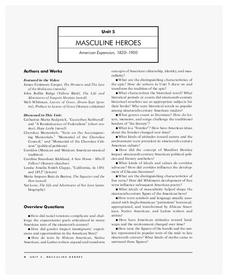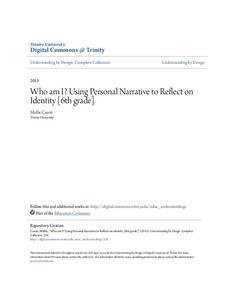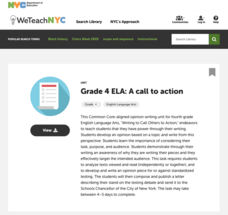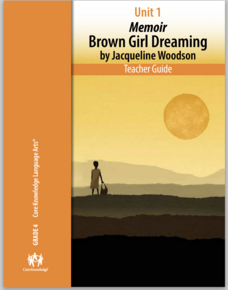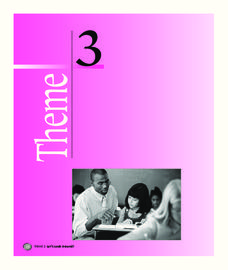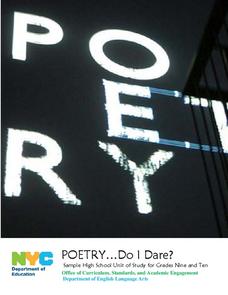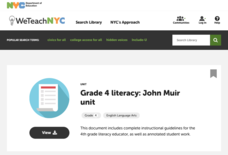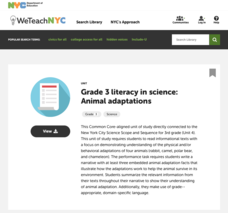Trinity University
Explain Yourself: An Expository Writing Unit for High School
Introduce expository writing with a unit that asks writers to craft an essay to explain a belief, value, or priority that is important to them. Mini-lessons within the unit focus on crafting thesis statements and conclusions, selecting...
New York City Department of Education
Grade 5 Literacy: TCRWP Nonfiction Reading and Opinion/Argument Writing
Choose a side! Pupils watch and read several nonfiction resources about zoos. After gathering their research, they choose a side either for or against closing zoos. Scholars complete KWL charts, anticipation guides, flow charts, and...
British Council
Unit 8: Proofreading
Plagued by punctuation or stymied by spelling? Lesson eight in a nine-part series of career education and skills activities introduces the importance of proofreading. Learners categorize common writing errors and construct error-free...
Building Evidence-Based Arguments: Grade 9
High schoolers investigate the dilemma of a proportional response with a lesson about the history of terrorism and militant extremists in the United States. As they examine memos from the FBI and speeches from President Bush and Obama,...
Annenberg Foundation
Masculine Heroes
What were the driving forces behind American expansion in the nineteenth century, and what were its effects? Scholars watch a video, read biographies, engage in discussion, write journals and poetry, draw, and create a multimedia...
Trinity University
Who Am I? Using Personal Narrative to Reflect on Identity
Who am I? Pupils work to answer this question through a unit that explores personal narratives and identity. Exit tickets for activities that examine different poems, short stories, and autobiographical writing serve as prewriting for...
New York City Department of Education
Grade 4 Literacy in English Language Arts: A Call to Action
You have the power! Scholars learn that they have power of the pen in their writing. After reading and viewing various sources about standardized testing, they express their own opinions about the testing by writing letters to the...
Core Knowledge Foundation
Unit 1: Memoir - Brown Girl Dreaming by Jacqueline Woodson
The memoir, Brown Girl Dreaming by Jacqueline Woodson, is the focus of a unit designed for fourth graders. Scholars begin each lesson with a warm-up, then listen to a read-aloud of a section of the book. Pupils complete word work,...
Core Knowledge Foundation
Unit 1: Contemporary Fiction - They Call Me Güero: A Border Kid’s Poems by David Bowles
They Call Me Güero: A Border Kid's Poems by David Bowles is the focus of a five-week language arts unit unit. Fifth graders listen to various poems and participate in thoughtful discussions, examining vocabulary and learning new words in...
Core Knowledge Foundation
Unit 6: American Revolution
The American Revolution is the theme of a five-week unit that focuses on reading, grammar, morphology, and writing. Scholars read and respond to texts, practice spelling and word work, and write paragraphs. Assessments gauge comprehension.
Annenberg Foundation
Rhythms in Poetry
Rhyme, rhythm, free verse, imagery: Do these words describe poetry, or jazz music? The answer is both! A resource explores these similarities as scholars watch a video, engage in discussion, read author biographies, write poetry and...
Bill of Rights Institute
Preserving the Bill of Rights
Consider how America's founding fathers and their experiences contributed to the rights we all enjoy today. A collection of reading, writing, and collaborative exercises prompt high schoolers to think about the ways their current lives...
New York City Department of Education
Grade 5 Literacy in English Language Arts: Should the School Day Be Longer?
Scholars read newspaper articles relating to a longer school day and complete note-taking organizers as they read. They then form opinions and complete outlines before writing essays supporting their point of view.
Curated OER
GSE Foundations of Algebra: Equations and Inequalities
Need lessons on writing and solving one- and two-step linear equations and inequalities, as well as systems of equations? This comprehensive 106-page module from the Georgia Department of Education contains many different lessons for a...
Houghton Mifflin Harcourt
Let’s Look Around!: Challenge Activities (Theme 3)
Let's Look Around! is the theme of a unit that offers a plethora of challenge activities. Enhance your scholars' learning experiences and reinforce concepts with activities such as writing a book about farm animals, an...
New York City Department of Education
Poetry…Do I Dare?
Whether you're considering a poetry unit or just want to incorporate more poetry in your curriculum, this unit plan is a must-have. Packed with poems, teaching points, powerful prompts, and poetry performance suggestions, the resource is...
New York City Department of Education
Grade 11 Literacy in Social Studies: Research Paper
The lesson guides young academics through the steps in producing a 10-page research paper on any topic in American history. Historians begin by formulating a thesis and gathering resources, then move on to creating an outline, and end...
New York City Department of Education
Grade 4 Literacy: John Muir Unit
Learn how to correctly analyze and score a written performance task. Example work shows annotated think alouds for grading. Teachers also have access to graphic organizers for helping writers succeed,
New York City Department of Education
Grade 3 Literacy in Science: Animal Adaptations
Third graders research and study animal adaptations and then use their findings to write narratives that include scientific criterion. This lesson is all about literacy and science! The lesson is completely designed for addressing Common...
New York City Department of Education
Grade K Literacy in Social Studies: Thinking About Families
Family is a wonderful subject for little learners to get excited about. Family is also the theme for a social studies unit that uses literacy standards throughout. The guide outlines approximately three weeks of instruction and breaks...
New York City Department of Education
Grade 8 Science: Genetic Modification of Organisms
Genetic modification is a hot topic in the science and political world. A complete unit gives learners an opportunity to research genetic modification, play an interactive genetic engineering simulation, and interact with the information...
Core Knowledge Foundation
Unit 4: The Time Machine by H. G. Wells Teacher Guide
Lead your readers into the fourth dimension as time travelers with a Core Knowledge Language Arts (CKLA) Teacher Guide of H. G. Wells's The Time Machine. The 144-page guide includes a unit calendar, introduction, nine lessons, teacher...
Partners Against Hate
Building Community and Combating Hate
Put a little love in your classroom! Help middle school scholars understand differences among people and build a sense of community within their school through 10 well-organized lessons. Each unique lesson incorporates writing,...
American Bar Association
News Literacy Model Curriculum in Social Studies
Scholars investigate news literacy in the twenty-first century. They use technology, legal decisions, writings, and digital privacy to analyze the topic. Using what they learned, a group assignment looks into both the challenges and...
Other popular searches
- Anticipatory Set Free Write
- Free Write Questions
- Free Write and Brainstorming
- Free Write Rubric
- Free Write Outlines
- Free Write on Antarctica
- Turkey Free Write




